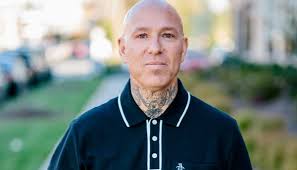Levine, N.: Difference between revisions
No edit summary |
m (Text replacement - "{{Footer}}" to "") |
||
| (6 intermediate revisions by 2 users not shown) | |||
| Line 2: | Line 2: | ||
|pagename=Levine, N. | |pagename=Levine, N. | ||
|PersonType=Authors of English Works; Western Buddhist Teachers | |PersonType=Authors of English Works; Western Buddhist Teachers | ||
|images=File:Levine Noah Lions Roar.jpeg | |||
|HasDrlPage=Yes | |HasDrlPage=Yes | ||
|HasLibPage=Yes | |HasLibPage=Yes | ||
|HasBnwPage=Yes | |HasBnwPage=Yes | ||
|MainNamePhon=Noah Levine | |||
|namefirst=Noah | |namefirst=Noah | ||
|namelast=Levine | |namelast=Levine | ||
|yearbirth=1971 | |||
|bio=Noah Levine (born 1971) is an American Buddhist teacher and author, son of American Buddhist teacher and poet Stephen Levine. As a counselor known for his philosophical alignment with Buddhism and punk ideology, he identifies his Buddhist beliefs and practices with both the Theravada and Mahayana traditions.[1] He has written several books on Buddhism and Buddhist practice including ''Refuge Recovery: A Buddhist Path to Recovering from Addiction''. | |||
He currently leads Dharma and vipassana meditation retreats and workshops across the United States and teaches weekly meditation classes in Los Angeles. A member of the Prison Dharma Network, Levine works with juvenile and adult prison inmates, combining meditation techniques with psychotherapy although he is not a licensed therapist or psychotherapist. He "[explores] how they can have a deeper understanding of what has happened and what they need to do in order to be free, on many levels—free from prison, free from the trauma of the past." | |||
He has helped found several groups and projects including the Mind Body Awareness Project, a non-profit organization that serves incarcerated youths, and Refuge Recovery, an addiction recovery community. ([https://en.wikipedia.org/wiki/Noah_Levine Source Accessed Dec 12, 2019]) | |||
|affiliationsecondary=Prison Dharma Network; Mind Body Awareness Project; Refuge Recovery | |||
|IsInGyatsa=No | |IsInGyatsa=No | ||
|classification=People | |classification=People | ||
|pagecreationdate=15 August 2017 | |pagecreationdate=15 August 2017 | ||
}} | }} | ||
Latest revision as of 14:38, 5 June 2024
| PersonType | Category:Authors of English Works Category:Western Buddhist Teachers |
|---|---|
| FirstName / namefirst | Noah |
| LastName / namelast | Levine |
| MainNamePhon | Noah Levine |
| bio | Noah Levine (born 1971) is an American Buddhist teacher and author, son of American Buddhist teacher and poet Stephen Levine. As a counselor known for his philosophical alignment with Buddhism and punk ideology, he identifies his Buddhist beliefs and practices with both the Theravada and Mahayana traditions.[1] He has written several books on Buddhism and Buddhist practice including Refuge Recovery: A Buddhist Path to Recovering from Addiction.
He currently leads Dharma and vipassana meditation retreats and workshops across the United States and teaches weekly meditation classes in Los Angeles. A member of the Prison Dharma Network, Levine works with juvenile and adult prison inmates, combining meditation techniques with psychotherapy although he is not a licensed therapist or psychotherapist. He "[explores] how they can have a deeper understanding of what has happened and what they need to do in order to be free, on many levels—free from prison, free from the trauma of the past." He has helped found several groups and projects including the Mind Body Awareness Project, a non-profit organization that serves incarcerated youths, and Refuge Recovery, an addiction recovery community. (Source Accessed Dec 12, 2019) |
| YearBirth | 1971 |
| affiliationsecondary | Prison Dharma Network; Mind Body Awareness Project; Refuge Recovery |
| IsInGyatsa | No |
| Other wikis |
If the page does not yet exist on the remote wiki, you can paste the tag |

